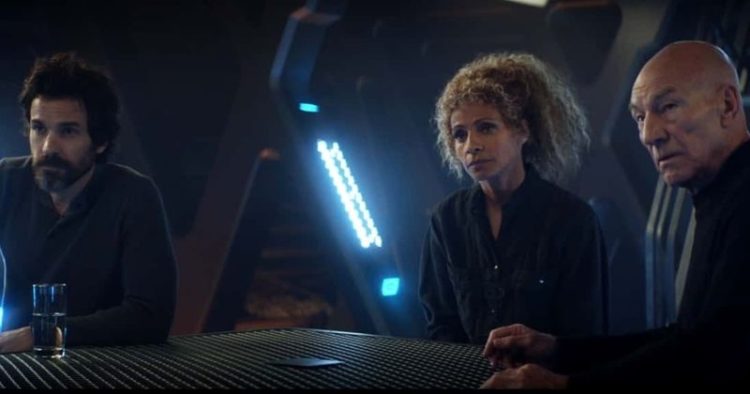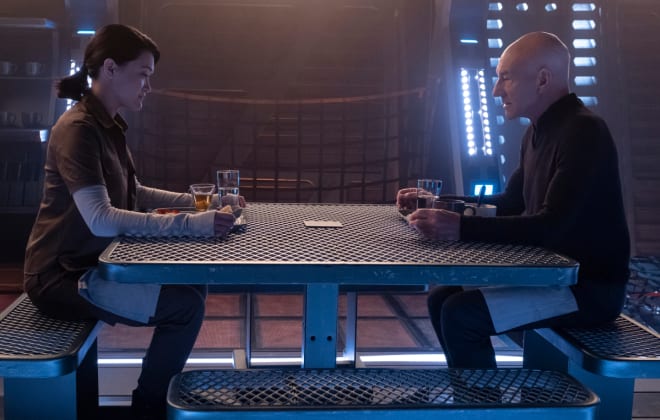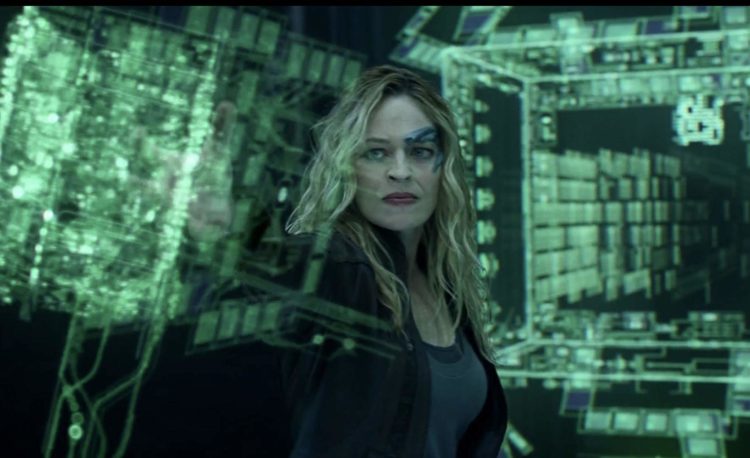
After last week’s nostalgia-heavy and emotional “Nepenthe”, Picard needed to turn the page from its expertly crafted character-heavy focus and home in on the overall narrative. “Broken Pieces” does just that, splitting time between character development while unraveling more of the plot surrounding the Zhat Vash undertaking. If there was a shortcoming this week, it was the over reliance of coincidence and connection between seemingly unrelated events.
A great example of this is Rios’ pain: still haunted by what occurred on the Ibn Majin and after the shock of meeting Soji, he unburdens himself to Raffi and then Picard. After being contacted by two emissaries, Beautiful Flower and Jana, Rios’ captain Alonso Vandermeer was given orders to execute the two guests by none other than Commodore Oh. Grief-stricken by his actions, Vandermeer eventually kills himself.
It’s taken nine years but now Rios has the answers for his captain’s actions. While we gain a better understanding of the Zhat Vash that goes beyond just an ardent hatred for synthetic life, we see, instead, it is born from experiencing the potential tragedy suffered by a long-dead civilization who, hundreds of thousands of years ago, fell to their own artificial creations. As a warning to those who would come after, they created the Admonishment — a structure that apparently offers viewers the terrible visions of a future should synthetic life be allowed to ascend past the threshold; a dividing line that has only one discernible outcome.

But the nuggets of coincidence don’t stop there. In a flashback detailing Narissa’s Admonition experience (under Commodore Oh’s tutelage), Ramdha’s relationship with Narissa and Narek — raising the siblings after their parents died — is revealed. More curious is that Ramdha’s emotional despair of her Admonition (where other Zhat Vash members killed and maimed themselves) was the catalyst responsible for crippling the Borg cube and causing it to be severed from the Collective.
The coincidental nature of these stories and how they mesh is a tad bit disappointing but it’s hard to be mad when the characters themselves are so interesting. In “Broken Pieces,” Rios takes home the award for most captivating performance. Santiago Cabrera shines and it’s not just on his ability to play the five distinct personalities that make up his self-scan holographic crew, but rather the pain he exhibits as Rios, drudging up memories he’d long since tried (and failed) to bury. Seeing Soji rip open the scab he’d thought sealed relieves us of the mysteries surrounding his character. Confronting his pain is a necessary step forward for the character and it comes at a time where the narrative speeds up and will undoubtedly require Rios to be at his best.

Which brings us to the overriding theme of Picard. As mentioned, the entire tenet of the Zhat Vash is based upon a glimpse of the end as told by an unknown species who themselves fell to their own aspirations to become gods. It’s clear the Zhat Vash (and Jurati) have absolute faith in these visions, despite no clear (as of yet) indication of proof. Seeing it from their perspective gives weight to their actions, and though it’s difficult to condone such measures (they orchestrated the attack on Mars and the death that brought), it adds much-needed depth to the Zhat Vash, making them less of an intolerant sect of zealots and more of noble warriors dedicated to saving all life.
Picard is less certain about their motivations, telling Rios at one point that “fear is the great destroyer”; he’s not wrong and, in fact, it’s a very accurate assessment of reality. The question becomes how do we balance warnings from the past with hopes for a better turnout in the future? People that repeat the same mistakes from the past often have no knowledge or understanding of that past, never taking the time to study the errors and misjudgments of their forefathers. On the other hand, sometimes the hubris in believing we are smarter and better equipped to lead the way forward than our progenitors blinds us. It very well may be that while Picard is right not to put all stock in a message left by a long-dead race, he may also be colored by his faith in humanity. In a way, Picard’s faith and hope is just as strong as the Zhat Vash, albeit on the opposing side of the coin. He believes in the exceptional nature of humanity whereas the Zhat Vash see the black and white of a civilization that tried and failed in the worst of ways.
This moral quandary is classic Trek and a sign of exceptional storytelling. “Broken Pieces” gives a perspective on the Zhat Vash that, while their behavior is still abhorrent and crude (with Narissa seemingly enjoying the pain and death, unlike her brother or even Commodore Oh), there’s purpose and logic behind their actions. And while we may be rooting for Picard and his merry band, it’s clear to me that there’s a chance that he could very well be wrong.
Make It So
- It’s not an accident that the Zhat Vash follow what could be described as a religious dogma. Much of their approach is based upon faith, not absolute fact (though the visions they experienced is convincing). Moreover, while Picard’s point of view is set up to be the right approach, “Broken Pieces” hints that it’s not as simple as he makes it out to be. It’s the best of both worlds (!) in that while our protagonists have the moral high ground, the antagonists eschew this for what could possibly be the greater good.
- After exhibiting her inner Terminator in “Stardust City Rag”, I feared that we wouldn’t see much of Seven before season’s end. Thankfully, she makes a convenient (there’s that word again) return, saving Elnor from Narissa’s security forces. Even more spectacular was her reconnection to the Borg Collective to thwart the Romulan threat aboard the Cube. Though Narissa spaces the still-assimilated drones and Seven effectively regains control of the Cube (and herself), putting the Cube in play for nothing more than some cool CG and saving two secondary characters seems like a waste. Add to that how Soji and the others use a Borg trans-warp tunnel to reach her home world, my money’s on this Cube (and Seven) playing an integral part in the finale.
